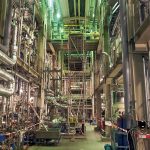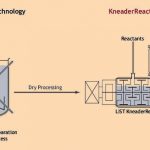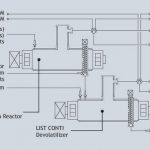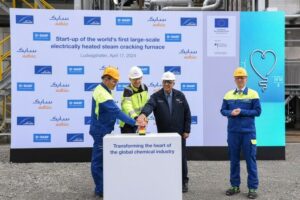Converting the polymer industry to solvent-free polymerisation processes and avoiding unnecessary recirculation decreases energy consumption and reduces waste production. This can be achieved with the horizontal large-volume Kneader Reactor with superior mixing and homogenisation performance. The casing, shafts and mixing elements are indirectly heated by heat transfer fluids and dynamically self-cleaning.
The authors: Prof. Michael Bartke Research Division Director, Fraunhofer IAP Andreas Diener Senior Process & Sales Engineer, List
Chemical processes, especially those involv-ing polymerisation, are usually carried out in dilute systems. These systems can be either heterophasic, such as suspension or emul- sion polymerisations, or homogeneous. The polymer obviously has to be separated from the solvent and the monomer in both cases. This separation involves several energy-intensive process steps – typically coagulation, stripping, drying and various other mechanical and thermal separation stages – to obtain the polymer product in its desired form.
These conventional methods of polymerisation make high demands with regard to raw materials and energy. For instance, solvent recirculation alone needs a processing capacity four to five times that of the polymer itself. Since the polymerisation process requires only parts-per-million levels of contaminants such as water, effective separation of water from the solvent is crucial to the energy balance of the process. Energy efficient alternatives for both bulk polymerisation and the downstream processing of the polymer solution are called for to overcome these issues.
Energy efficient bulk polymerisation
Polymers like PMMA, special biopolymers and adhesives are typically synthesised either using a solvent, which subsequently needs to be removed, or by bulk polymerisation, in which the monomer also acts as the solvent – with the disadvantage of limited conversion. The innovative List Kneader Reactor technology can overcome both of the above-mentioned drawbacks owing to its inherent features and its ability to process high viscosities. It is clear that polymerisation carried out in a highly concentrated phase will be extremely energy efficient and environmentally friendly compared to conventional alternatives.
The major challenge in solvent or bulk polymerisation is removing the solvent or recovering the monomer effectively. Standard processes require high volumes of monomer and therefore several removal steps. The problem is that once the solvent or monomer content drops below a certain level, the reactor content becomes highly viscous and very difficult to process. Kneader Reactors, however, can handle the resulting high viscosities due to their robust design and inherent technological features. With conversion rates of up to 97 % in the Kneader Reactor compared to around 50 % using standard technology, it is plain that much less monomer is needed for a given capacity and the main evaporation step can be dispensed with.
In addition to the advantage described above, the Kneader Reactor technology also offers unique advantages when it comes to the product itself. Product quality is the number one priority, especially in the case of polymers with a high sensitivity to gelling or crosslinking, so hot spots have to be avoided. To produce polymer of the highest quality requires precise control of the process conditions, especially temperature. The Kneader Reactor operates at low shear rates and this, combined with the ability to control pressure, temperature and concentration exactly, ensures the highest possible product quality and consistency.
Combining evaporative cooling by internal reflux with efficient mixing in the reactor guarantees sufficient heat removal even with highly exothermic reactions. The system is designed in such a way that the evaporative cooling does not hinder initiation, so the reaction can progress quickly to autothermal operation without requiring any ramping. The typical conversion rates for radical bulk polymerisation of biopolymers and adhesives in the reactor are up to 85 to 95 %.
The main advantages of the Kneader Reactor technology for bulk polymerisation are:
- Ability to process highly viscous material (up to 100,000 Pas)
- Low energy consumption, as no solvent is used and monomer utilisation is minimised
- High product consistency due to precise process control (temperature, pressure, concentration)
- High plant availability owing to the robust design and easy procedures for shut-down and restart
Direct devolatilisation
The same reactor concept and processing method allow highly effective devolatilisation. The high surface renewal rate, even for highly viscous products, enables very effective vapour disengagement. The direct devolatilisation process for polymer solutions manages without water coagulation, stripping and drying. The solvent, which is typically an aliphatic or aromatic hydrocarbon, is separated from the polymer in a closed system by flashing and direct evaporation, with simultaneous solvent recovery.
Polymers made in this way have exactly the same properties and meet the same product quality specifications as polymers produced in a conventional process. In fact, due to the high surface renewal, direct devolatilisation can even result in polymers that are superior in terms of volatiles content and degradation. In addition, a very tight specification can be complied with because the process conditions – notably temperature – can be controlled within a narrow window. The Kneader Reactor concept has the following advantages for devolatilisation:
- 30 to 50 % less energy consumption because no extra effort is needed for stripping and drying
- 50 to 70 % less condensation effort because no stripping medium has to be condensed
- 40 to 60 % smaller footprint thanks to the compact nature of the plant
- 90 to 95 % less water and air pollution owing to the use of a closed system
- High flexibility for new grades and special product properties
Pilot plant for process development
The transition to solvent-free processes cannot be completed efficiently without new polymerisation know-how, for example regarding catalysts and mechanisms for initiation and termination. Laboratory and pilot-scale reactor systems help polymer producers gain the expertise they need to optimise their processes for solvent-free operation and scale up to full production size. At its test centre in Arisdorf, Switzerland, List offers an appropriate range of machine types and sizes for successful batch and continuous trials that can be used to prove the concept and generate scale-up data. Du-ring the final development phase it can make sense to test the concept and confirm the scale-up data in a semi-commercial trial. A plant for this purpose is available at the Fraunhofer Polymer Pilot Plant Centre in Schkopau, Germany. The Fraunhofer centre carries out the trial together with List. Trials at the Schkopau semi-commercial plant provide reliable confirmation about the expected product quality, process controllability, long-term stability and other important benchmarks. With such high-quality data, production-scale plants can be designed without significant risks and with product properties guaranteed.
cpp-net.com/0112432
Share:









